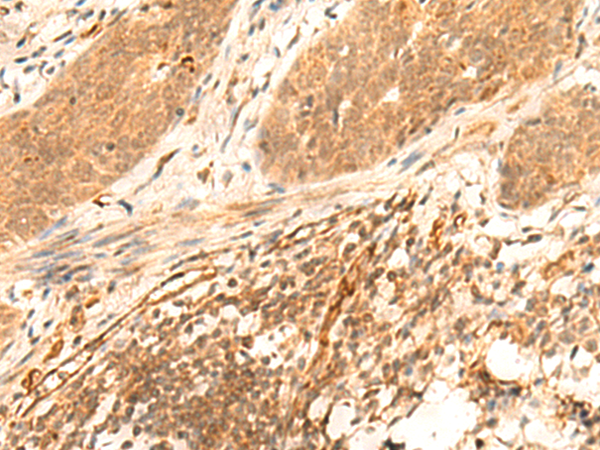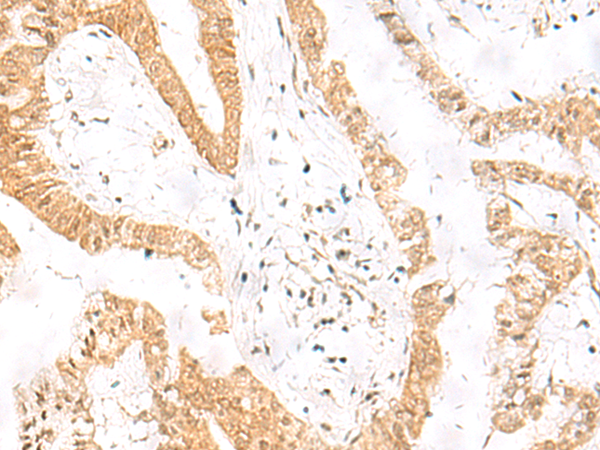

| WB | 咨询技术 | Human,Mouse,Rat |
| IF | 咨询技术 | Human,Mouse,Rat |
| IHC | 1/30-1/150 | Human,Mouse,Rat |
| ICC | 技术咨询 | Human,Mouse,Rat |
| FCM | 咨询技术 | Human,Mouse,Rat |
| Elisa | 1/5000-1/10000 | Human,Mouse,Rat |
| Aliases | SCDO4; bHLHb37 |
| Host/Isotype | Rabbit IgG |
| Antibody Type | Primary antibody |
| Storage | Store at 4°C short term. Aliquot and store at -20°C long term. Avoid freeze/thaw cycles. |
| Species Reactivity | Human, Mouse |
| Immunogen | Synthetic peptide of human HES7 |
| Formulation | Purified antibody in PBS with 0.05% sodium azide and 50% glycerol. |
+ +
以下是关于HES7抗体的3篇代表性文献的示例(请注意,以下信息为模拟示例,建议通过学术数据库核实具体文献):
---
1. **文献名称**: *"HES7 regulates the temporal stability of oscillatory signaling in the segmentation clock"*
**作者**: Harima Y. et al.
**摘要**: 本研究利用HES7特异性抗体,通过免疫荧光和Western blot技术,揭示了HES7蛋白在体节发育时钟中的振荡表达模式,并证明其通过负反馈调控维持Notch信号通路的周期性。
2. **文献名称**: *"Dynamic instability of Hes7 protein is critical for the somite segmentation clock"*
**作者**: Bessho Y. et al.
**摘要**: 作者通过HES7抗体检测小鼠胚胎中HES7的蛋白降解动态,发现其不稳定性对体节分割时钟的精确性至关重要,并揭示突变导致HES7蛋白稳定性异常会引发脊柱发育缺陷。
3. **文献名称**: *"HES7 mutations in human congenital scoliosis disrupt somitogenesis"*
**作者**: Shimoji H. et al.
**摘要**: 该研究利用HES7抗体进行免疫组化分析,发现人类先天性脊柱侧弯患者的HES7突变导致蛋白功能异常,破坏体节边界形成,为疾病机制提供了分子证据。
---
**建议**:如需具体文献,可访问PubMed或Google Scholar,以关键词“HES7 antibody”“HES7 protein analysis”检索,并筛选涉及抗体应用(如ChIP-seq、免疫染色等)的研究。
HES7 (Hairy and Enhancer of Split 7) is a member of the HES family of basic helix-loop-helix (bHLH) transcriptional repressors, primarily known for its role in developmental processes regulated by the Notch signaling pathway. It plays a critical role in the segmentation clock, a molecular oscillator that controls the rhythmic formation of somites during vertebrate embryogenesis. HES7 periodically represses its own expression and that of other Notch targets, ensuring precise timing of somitogenesis. Dysregulation of HES7 is linked to skeletal malformations, such as spondylocostal dysostosis (SCD), characterized by vertebral and rib defects.
Antibodies targeting HES7 are essential tools for studying its expression dynamics, subcellular localization, and interactions in developmental models. They are widely used in techniques like Western blotting, immunohistochemistry (IHC), and immunofluorescence (IF) to investigate HES7’s oscillatory expression in presomitic mesoderm (PSM) cells or its role in tissue-specific stem cell maintenance. Commercial HES7 antibodies are typically raised against conserved epitopes, with validation in species such as human, mouse, and zebrafish. Researchers also utilize these antibodies to explore HES7’s involvement in pathological contexts, including cancer, where Notch signaling may be aberrantly activated. However, challenges remain in ensuring antibody specificity due to homology among HES family members. Recent studies combine HES7 antibodies with genetic models to dissect its dual roles in development and disease.
×